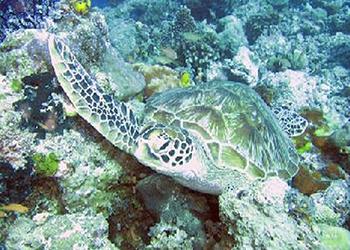
By Shuchen Chang
TAIPEI, Taiwan, September 1, 2015 (ENS) – Taiwan is establishing a new government agency to coordinate and implement the island country’s marine policies and strengthen conservation of its ocean environment.
Taiwan’s legislators passed a law in June that enables the creation of a cabinet-level Ocean Affairs Council and subordinate agencies, including an Ocean Conservation Administration and a National Academy for Ocean Research.
The law places the Coast Guard Administration under the jurisdiction of the Council.

The Ocean Affairs Council is to take charge of overall marine policy, marine biodiversity and sustainability, marine conservation zones, marine education and research, coastal security, and the internalization of international ocean law.
Wen-yan Chiau, a Taiwanese legislator and a professor specializing in marine conservation and governance, explains, “For the last two decades, academia has been calling for the establishment of a central competent authority to address the fact that Taiwan is a marine country and its people rely on the sea for food and resources.”
Surrounded by ocean waters, Taiwan is located some 180 kilometres (110 miles) off the southeast coast of mainland China.
Said researcher Kwang-tsao Shao from Biodiversity Research Center, Academia Sinica, “Taiwan is surrounded by sea on all sides. Its sea territory is about three times the size of its land area. However, much of the territorial planning and environmental management focuses just on the land and rarely on the sea for historical reasons.”
Before 1988, under martial law, marine and coastal areas were part of Taiwan’s defense system. Many of them were designated as restricted areas and heavily guarded by police and naval personnel. The Taiwanese government hardly engaged in any serious marine research nor did it gain much experience in marine management.
It was not until martial law ended and cross-strait tension between Taiwan and China eased that new marine polices were proposed.
In 1998, as a response to the United Nations’ designation of the year as the International Year of the Ocean, the Conference on National Oceans Policy was held at National Sun Yat-sen University in southern Taiwan. Its conclusions were published as the Oceans White Paper.
The Oceans White Paper gave a preliminary analysis of marine issues facing Taiwan – coastal security, marine conservation and management, maritime management and development, marine tourism, and marine research and education.
By 2006, it had developed into The Oceans Policy White Paper, which served as the foundation of governmental administration to build Taiwan as a safe, healthy, and thriving ocean state.
Still, long-standing negligence by the government and society has damaged Taiwan’s marine environment.
An ecologically rich habitat, Taiwan is suffering from massive resource depletion due to overfishing, habitat destruction, pollution and invasive species introduction, Shao reported in his 2009 paper, “Marine biodiversity and fishery sustainability.”

“Fifty years ago, many people believed that the ocean was so vast and so resilient that there was no way the marine environment could be changed. … Half a century later, we all agree that the depletion of fishery resources is happening, mainly due to anthropogenic factors,” Shao observed.
Part of the problem is that responsibility for Taiwan’s marine affairs is scattered among various government departments.
Taiwan’s marine and coastal affairs are currently in the hands of, among others: the Fisheries Agency, whose priority is not conservation but improving economic livelihood; the Forestry Bureau, which manages mainly land resources; the Environmental Protection Administration, whose job is to crack down on environmental violations; and the Coast Guard Administration, which curbs smuggling and illegal immigration.
As a result, governmental conservation efforts are mired in inefficiency and confusion.
The Amorgos oil spill in 2001 near Kenting National Park demonstrated the consequences of spreading duties among different agencies and administrative levels.
About 1,300 tons of fuel oil leaked from the Greek merchant ship Amorgos into the sea surrounding Taiwan’s southernmost tip, causing major damage to the maritime and local environment.
As the jurisdiction among government agencies was unclear, the Environmental Protection Administration was slow to respond to the spill. Meanwhile, the oil spread to cover a larger area, creating a hazardous environment for the fish, corals, 200 bird species and 2,200 plant species of Kenting National Park.
Another example of the need for an Ocean Affairs Council is the Fishery Agency, which monitors commercial fish resources and puts less emphasis on conservation of non-commercial species.
Recently discovered corals such as Pseudosiderastrea formosa and Polycyanthus chiashanensis are adversely affected by coastal development, but the agency has not yet included them on the list of Taiwan’s first-level protected species.
Ai-Lung Lin, who chairs the Taiwanese marine conservation group Oceanus Honors Gaia, said that existing administrative resources need to be integrated, and a dedicated agency is required to increase operational efficiency and implement what would otherwise be marginalized or overlooked.
Environmental groups hope the new agency will lead to a clearer delegation of duties, a sufficient legal basis and research support for effective protection of Taiwan’s marine environment.
{Copublished with Taiwan Environmental Information Association}
© 2015, Environment News Service. All rights reserved. Content may be quoted only with proper attribution and a direct link to the original article. Full reproduction is prohibited.
